Ash was a late addition to Alien, first coming into the script when producers David Giler and Walter Hill were continuously rewriting Dan O’Bannon’s screenplay. Hill attributed his creation to one of Giler’s jokes. “He’s got a marvellous capacity for coming up with the unexpected,” Hill said, “a u-turn that’s novel but at the same time underlines what you’re trying to do. A lot of the time he’ll present it as a joke, and it’ll turn out to be a great idea. Like in Alien, when the Ian Holm character was revealed to be a droid – that was David.”
From the way the two describe the concept of Ash’s beheading scene, it seems as though the character originally began as a human. “Walter Hill and I were writing the script,” Giler told Fantastic Films, “and we had invented the subplot of this dodging character. And Hill said, ‘I have what I think is a dreadful idea, or a really good one. What do you think of this? Suppose, in this part, whack! his head comes off and he’s a robot?’”
The revelation that Ash was a robot would, the producers hoped, give the movie another story-defining shock in the wake of the chestburster. Giler also came up with one more gag: “And we’ll put [Ash] on a table and then we’ll have the head talk.” Hill agreed, and “We went back and made the subplot work for that. Actually at one time I wanted the first words from the robot on the table to be the Kipling poem, ‘If you could keep your head all about you…’”
Notice here that first, Ash began as a ‘dodging character’; essentially an underhanded nuisance (consider it a proto-Burke, if you can). When it comes to dispatching the character the producers come up with the idea of him being a robot, and so they rewrite the script to accommodate this new idea. Interestingly, Giler attributes the android idea to Walter, and vice versa.
“What I liked was the low-key cadence of the characters, which I always wanted to keep it real, and the people real, with normal behavioural patterns, not a movie character. That’s why Ash is particularly interesting, because you don’t really know if there’s anything special going on about him other than the fact he seems to be a bit of a stickler for process and he might be ruthless. You just don’t know whether he’s evil or not. But obviously he’s got some kind of itinerary going on, with his fascination of everything attached to this new discovery of the Alien…”
~ Ridley Scott, Alien commentary, 2003
In addition to that, Ridley seemed to confirm that Ash’s (in)humanity was in the air from the beginning; at one point, he could have been an alien himself. “We could have had a Martian in the crew,” Ridley explained. “He’s not much different [from the other crew], perhaps just slightly waxy skin and two small holes in his head. Biological changes rather than mechanical ones.” However Ridley found his alien-Ash idea quickly nixed: “I was, to a certain extent, held down by my producers. They didn’t know me from Adam, so they tried to keep things in balance. Alone I would have done more.”
Having said that, Ridley did concede that having a Martian standing out so conspicuously would draw viewers out of the film. “If you have a Martian in there, the audience is going to be staring at him. Not only that, but we could then have been directly compared to Star Wars or Star Trek.”
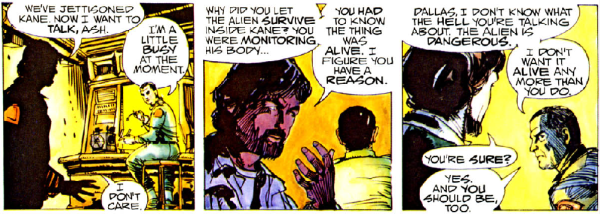
In the script Dallas was less passive in regards to Ash and confronted him concerning the chestburster within Kane. This scene was not filmed but made its way into the comic book adaptation.
The android twist was met with disdain by O’Bannon and alleged skepticism from Twentieth Century Fox, but Ron Shusett stuck up for the idea. “While we were at [Fox], Giler and Hill, who were my co-producers, came up with this idea and wrote it into the script,” Shusett explained. “Everybody hated it but me. The studio was afraid of it. Dan said, ‘I don’t like it.’ Their own partner [Gordon Carroll] said, ‘It’ll be a mish-mosh.’ I said, ‘Let’s film it and preview it.’”
“I thought it was a brilliant concept,” he continues, “and it gave a resonance to everything that came before, because you think back to when Ash opened the door and let the creature on board, you realize he wasn’t human, so of course he could have the lacking of humanity to sacrifice all the humans as long as he saved the Alien. That gave [the movie] an underbelly that helped it last through the years. When we filmed it, we weren’t sure it would work. We tried it on an audience, an invited audience. That was the only way that everybody said, ‘Oh, you need that.’ … I saw it at a preview in Dallas: when that robot’s head came off, an usher actually fainted!”
“There was no Ash in my original script,” said O’Bannon, “they added that. The idea being here that all scripts must have a subplot, simply to have a single plot by itself is inadequate, all stories must have subplots, so they created a subplot. Ian Holm gives a brilliant performance, it’s brilliantly directed by Ridley, but if you stop and think about it, if it wasn’t in there what difference would it make one way or the other, I mean, who gives a rat’s ass, I mean so somebody is a robot?”
“It annoyed me when they did it,” he continued, “because it was what I called ‘The Russian Spy’. It was a tendency in certain types of thrillers, when people are on an interesting mission, to stick in a Russian spy. One of them is a spy and they don’t know which one, he’s trying to screw up the mission, Fantastic Voyage had that. When I saw Fantastic Voyage, I thought it annoying … instead of it adding any genuine suspense, all it did was annoy me … It’s a tension device which is commonly resorted to and doesn’t work because it doesn’t provide any real suspense. It doesn’t do anything except provide finger exercise for the writer who thinks that all stories must have subplots. So, I think its an inferior idea of inferior minds: well acted, well directed, and fortunately it occupies little enough screen time that it doesn’t disrupt the main plot.”
Ridley himself disagreed, saying years later: “This is a great turnabout in the story because just when you think your main and only aggressor is this thing loose on the ship, you’ve now got a much bigger problem – you’ve got two aggressors, which raises the paranoia and that of the audience twofold.”
Mu-th-r: as for Ash’s ‘accomplice’, the Nostromo’s computer, Ridley explained the naming process as thus: “Kubrick had already found a great name for his computer, which was called HAL. I couldn’t think of anything to say but Mum, or Mother.”
But why would the Company place an android on their ships and keep its identity a secret? According to Ridley, they are insistent “on placing a company man on each vehicle. In this vehicle, he takes the form of a robot, Ash. This would seem to be the normal development of a huge corporation trying to protect its interests. In this particular future, it would be very easy for “pirating” to exist. Corporations will have to find ways to assure that vehicles carrying minerals or vital information will not be hijacked.”
He elaborated on the idea of robots and corporations within the wider, but unseen, Alien universe, saying: “[T]he world has been converted into the property of two or three large conglomerates whose sources of energy are provided by the exploitation of deposits in space. The super cargo spaceships that link Earth and the planets would transport enormous loads of minerals: gas, oil and the like. To dissuade the crews from rebelling and to protect their own interests, these companies might place spies aboard, or at least would make the crews believe in the presence of such spies. Gradually a legend would evolve that these people, whose identities remain unknown, are in fact robots. Furthermore, nobody would ever have proof. This would reinforce legends already currently among the astronauts.”
Ash was placed deliberately on the Nostromo so the Company could successfully investigate a beacon emanating from a mysterious, far-out planetoid. However, Ridley has repeatedly shot down the suggestion that the Company was aware of the Alien payload: “I think any corporation that sends probes into unknown territory is going to think of the possibility of finding something new,” he said. “I’m sure that the crew members on all its ships would have been briefed to bring back anything of interest. It would be part of one’s job to bring it back. An alien, of course, would be of top priority. This particular corporation didn’t have a preconceived notion that an alien would be found on this mission, much less the particular Alien that is brought onto the ship. The idea of bringing it back alive would not have been on the minds of the corporate executives when they first received the alien transmission. They just had high expectations when they ordered the Nostromo to investigate – it was purely out of curiosity.”
This of course also explains Weyland-Yutani’s lack of action regarding the derelict and the eggs following the events of Alien. Ridley added: “I would have thought that Earth would have previously received messages [from space], realised they were coming from an intelligent source but, for economy reasons, perhaps have postponed the preparation of an investigatory spacecraft. Then, one day, Nostromo is in the vicinity and the order is given for the crew to bring back the Alien, good or evil, without any real thought being given to the consequences. The presence of the robot virtually guarantees, in principle, the success of the mission.“
Alien/Android Antagonism: The Alien quickly proves to be hostile, but does Ash have any reason to fear it? “We theorised that the Alien would feel or understand that Ash was a construction of robotics, however complex and strange,” Scott told Omni’s Screen Flights in 1984. “Because Ash wasn’t human, he’d have been no use as a host for its eggs.”
The two also share a sort of kinship beyond Ash’s worship of the creature, according to Scott. Ash is also a biomechanoid, albeit of human manufacture. He is an alien with a human face.
Ash succeeds in obtaining a specimen, though it runs amok through the ship, killing the crew one-by-one. Ash’s own death comes due to his inability to maintain his ruse. “If you create a model as perfect as that,” said Ridley, “it will have, almost of necessity, a form of ’emotional life’.”
Ash was programmed with a human ‘back-story’, though he was well aware of his artificial nature: “That was a consideration I had to deal with,” Ridley told fantastic Films. “There are a number of ways of approaching it, but the possibilities come down to either letting him know or programming him so he thinks he’s human. All the space in between was open, but we went with letting him know. If we had decided to keep it from him, there were all kinds of things we could have done, from programming him to know at a certain point, like an emergency, or even putting a complete memory tape in him that would give him a complete background – parents, schooling, brothers, the whole thing.”
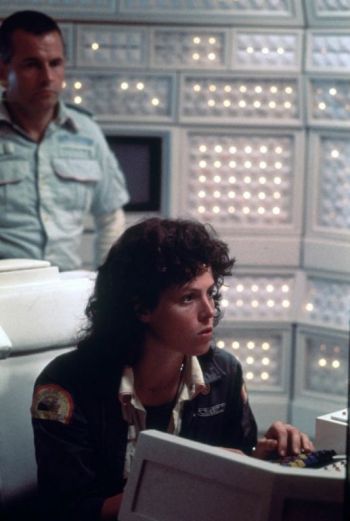
“This scene is peculiar because you wonder how Ash got in behind her … [Ripley’s] not going to get any more information [from him], and she’s dipping into Company records and is not going to get the right answer … I liked Ash reacting to human emotion … he wasn’t frightened of her, he was backing off, he didn’t understand why she was crying, probably because he had never seen that before, so you got that rather peculiar reaction from Ash as she shrinks away…”
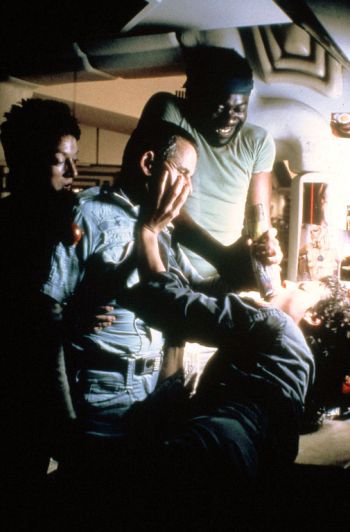
‘”Now we have malevolence, which is even stranger by just adding one simple thing which just came out in the day – he’s beginning to perspire, and this perspiration is white … I guess this [attack] is the closest thing to seeing a robot have sex, huh. I needed to have some show of strength which was simple but violent.”
~ Ridley Scott, Alien commentary, 1999.
Ash’s awareness of this duality (among other factors) may have contributed to his ‘breakdown’, as Scott explained that his complexity made him more than an automaton:
“You don’t have only a physical and mental mechanism, but a machine that is capable at any moment of uncontrollable emotional reactions and which will take certain decisions by itself. Like HAL in 2001. Here, no one has considered that in building a robot, it had been given a psychological life, with worries and problems. This perfect machine starts to have feelings when faced with the behaviour of humans. It starts to be interested in the women and to have desires that cannot be expressed. Behind the assault on Ripley is an attempt to solve these tensions, a sort of rape…”
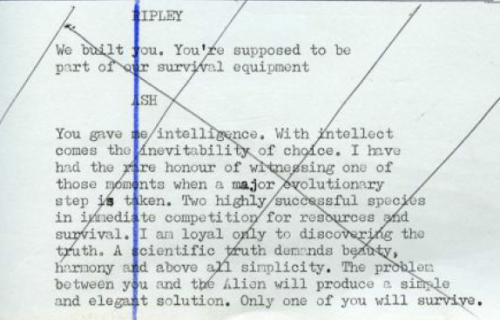
Excised dialogue explaining Ash’s ‘motivation’.
Android apartheid? In 1987 Lance Henriksen commented on what he perceived would be an android’s inner turmoil, and they are interesting comments in light of the series’ entire range of androids, Ash included: “I read a couple of books. One was Mockingbird [by Walter Tevis]. There’s a bit in it where the android knew how to play a piano, but didn’t know why. He didn’t know what music was, but he kept hearing it. It was part of his builder’s input that hadn’t been completely erased. That image stuck in my mind, and what it translated to me was that there were feelings that Bishop didn’t understand.”
Additionally, Henriksen reckoned Bishop and his ilk were aware of their lowly statuses as ‘un-humans’; this would understandably create friction, possibly like the type of breakdown we see with Ash: “For him, the world is xenophobic,” Lance said, “He’s an alien to anything alive.” The androids are an entire race created to serve. In a sense, they are a slave race: “You’re either replaced or you’re destroyed,” mused Henriksen. Perhaps Bishop’s line that Ash’s model of android was always “twitchy” has more sinister connotations; perhaps each model was systematically ‘junked’ sometime between Alien and Aliens. For the newer, more obedient Bishop-era android, maybe asking to be called an ‘artificial person’ rather than a robot is a plea for respect that is normally not given to these belittled mechanised beings.
One last thought: we know that Prometheus’ David was mass-produced, and Bishop-types have flooded the expanded universe, but would this make sense if machines like Ash are meant to be infiltrators and spies? We can only theoreticise that each Ash-type was uniquely designed in order to fulfill its objective. After such models proved to be undesirably emotional, or “twitchy”, new android lines once again had their individualities taken away from them, from their physical appearances and even down to their programming.
Ash ends his life, like Kane, on a canteen table – ironic considering that it was Ash’s malfeasance that allowed the Alien to grow undetected. In return, he is decapitated by Parker, decommissioned by Lambert, disconnected by Ripley, and then finally immolated.
!["A lot of this stuff we had to make up on the day. So we couldn't work out how to kill Ash. So we used one of those cattle prods and also left his interior to really be an organic choice, rather than having steel pipes and things like that [as innards] ... I loved the glass marbles on the strands and the teeny bits of fibre-optics, and of course his blood ... we worked forever trying to find what would be the voice of a dying robot. It's almost a doppler effect. Spooky." ~ Ridley Scott, Alien commentary, 1999.](https://alienseries.files.wordpress.com/2013/08/ashremains.jpg?w=400&h=400)
“A lot of this stuff we had to make up on the day. So we couldn’t work out how to kill Ash. So we used one of those cattle prods and also left his interior to really be an organic choice, rather than having steel pipes and things like that [as innards] … I loved the glass marbles on the strands and the teeny bits of fibre-optics, and of course his blood … we worked forever trying to find what would be the voice of a dying robot. It’s almost a doppler effect. Spooky.”
~ Ridley Scott, Alien commentary, 1999.
“Of its genre, I think that [Alien] has become a classic, so people still send me photographs to sign. John Hurt, as you know, had an even more famous scene where an Alien pops out of his stomach. I remember some of the Americans coming up to him the day before [filming] and saying, ‘Hey, John, it’s the big scene tomorrow. Do you have ideas how you’re going to approach this whole thing?’ John looked at me and winked and said, ‘I don’t know really. [Deep sigh] I suppose… I’ll just… bring my not inconsiderable imagination to bear… and just… do it!’ I think that’s in a nutshell what I do. I just do it.’
~ Ian Holm.
Before he goes Ash delivers one of the series’ most famous monologues, which was written by David Giler on the morning of the shoot. The earlier scripts featured a less poetic turn, with Ash soliloquising like a Bond villain in some iterations and having no final dialogue at all in others.
“This was a really doomy speech,” said Scott, “about the indestructibility and the perfection of what they were up against [with the Alien], and this was a scene written during photography because we never were really happy about the dialogue we had, and I think that Dave [Giler] really had to work on this incessantly as we headed towards the actual day. I think we actually came up with the words that morning, or David did.”
According to Veronica Cartwright, two versions of the scene were shot: the first was as originally scripted (a lot of explanatory plot talk) and the second featured the dialogue as we know it. Only Holm’s scenes were reshot, with the crew’s reactions carried over from the first shoot. “The original scene had more grapey things and stuff [around Ash],” claimed Cartwright. “I talked to Ian later, he said they went back and reshot with more tubey looking odds and ends, and they also changed the dialogue … Originally, this is where [Ash] brought up ‘has anybody tried to communicate with [the Alien]?’ and we were all standing around, listening to him … So here we are, we were all sitting there with bated breath listening to Ian, he’s got his head in the middle of the table, you know with grapes and all sorts of stuff hanging off his head, [but] what you see is Ian months later [when they] redid it.”
The reshooting, if it happened at all, was unlikely to be months later: it was perhaps only days or weeks at the most, considering the film’s limited budget and schedule – it may have even been shot later on that first day. Ridley usually refers to the scene as having been shot very quickly, with the burning of Ash’s body being done only in one take.
“I loved his ideas,” Cartwright said of Holms’ performance. “He had this twitch, which you don’t get to see very much. He starts out fine, but as he starts to get [on] this left eye would twitch all the time as he starts to break down.”
Still, despite all, Dan O’Bannon remained adamant that Ash was a detraction for the film. “The whole point of Alien, according to Walter Hill, is that evil corporations created this situation; this crew wouldn’t even be in this desperate situation in the first place if the evil corporation hadn’t sought out this organism and decided to use it as a weapon, and stuck a robot on board to deceive the crew and get them trapped in this situation where this alien organism can do its worst and show that it would be very good for the corporation’s weapon systems. As far as Walter Hill is concerned, that’s what the movie is about.”

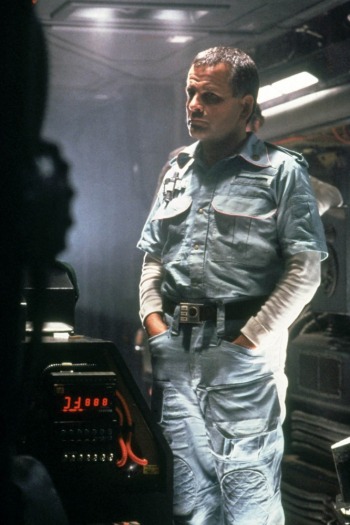
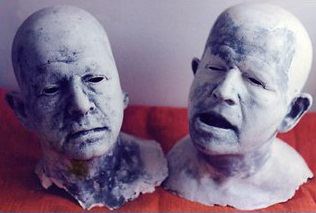
The ash reveal IS one of my fave parts of Alien.
But I wonder if the concept came from trying to one up O’Bannons chestburster?
And I was only ever mildly inspired by the Weylan corporate intrigue.
(I love it now.)
My favorite part of the Ash reveal is that
there is one LESS of them,
then WE/them thought!
A fascinating read.
Thanks.
Thoughtful informed analysis of the topic. I went on the read “Mockingbird”, mentioned by Lance Henriksen as a point of research for his role as Bishop. The novel provides a perspective on androids I had never come across in all my years of reading science fiction. The android in that novel is called ‘Spofford’ and he is not your stereotypical android, although he does carry out his programming to its most extreme. Thanks for a good article. When i review the novel on Goodreads.com, I plan to cross-link your site so anyone interested can read your article.
I’ll probably go on to read the novel too, based on this recommendation. It sounds good! I hit the like button on your book review over at Goodreads.
There are times when I felt really sorry for Ash, and I LOVE the way that Lambert is the only one to realize the fact that Ash ADMIRES the alien.